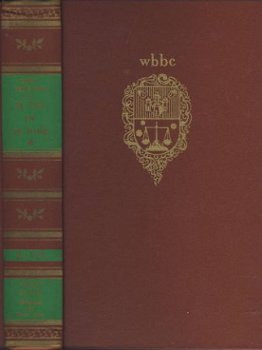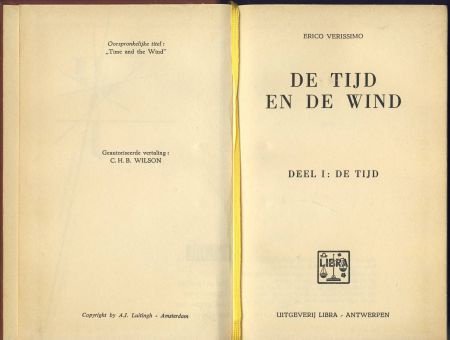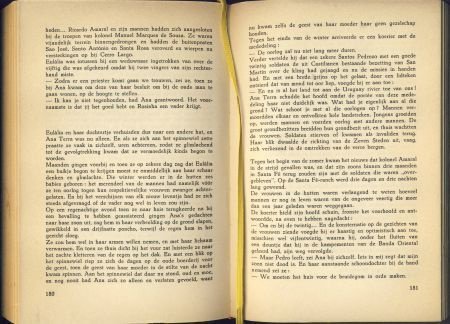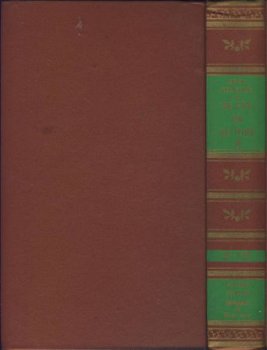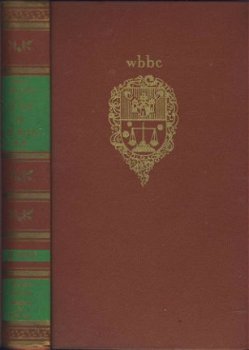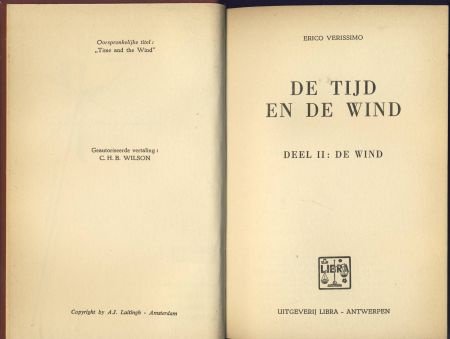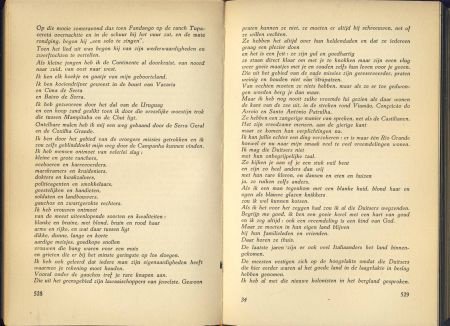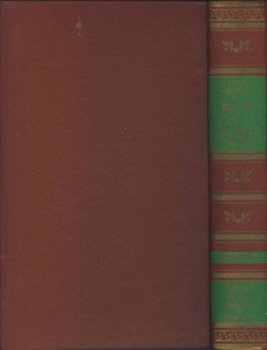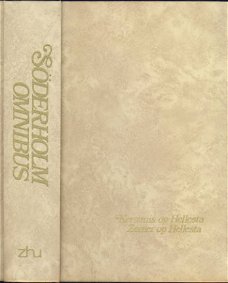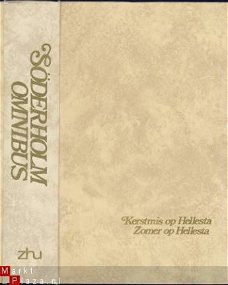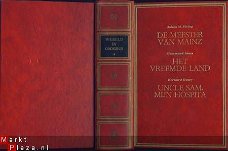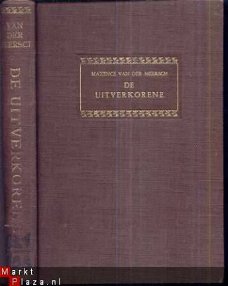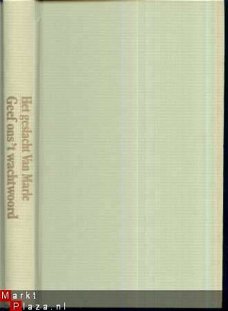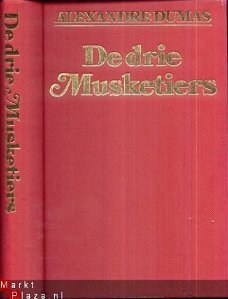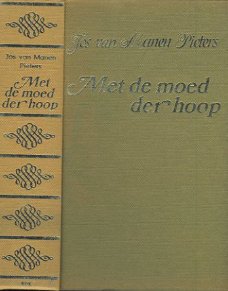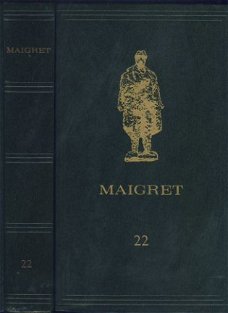
ERICO VERISSIMO**DE TIJD EN DE WIND**TIME AND THE WIND**
Kenmerken
- Conditie
- Gebruikt
- Levering
- Niet van toepassing
Omschrijving
ERICO VERISSIMO
**DE TIJD EN DE WIND**
**TIME AND THE WIND*
GEAUTORISEERDE VERTALING:C.H.B. WILSON
UITGEVERIJ LIBRA ANTWERPEN
**DEEL I :DE TIJD + DEEL II :DE WIND.**
GEAUTORISEERDE VERTALING:C.H.B. WILSON
UITGEVERIJ LIBRA ANTWERPEN
DEEL I : FORMAAT 219 X 143 X 35 + 643 PGS + 553 GRMS CODE 93.533
DEEL II:FORMAAT 219 X 142 X 38 + 363 PGS + 551 GRMS CODE 92.831
VERZENDING IN BELGIE : 5,50 EURO NR NEDERLAND 8,50 EURO
Erico Verissimo [1] (December 17, 1905 - November 28, 1975) was an important Brazilian writer, born in the State of Rio Grande do Sul. His father, Sebastião Veríssimo da Fonseca, heir of a rich family in Cruz Alta, Rio Grande do Sul, met financial ruin during his son's youth. Veríssimo worked in a pharmacy before obtaining a job at Editora Globo, a book publisher, where he translated and released works of writers like Aldous Huxley. During the Second World War, he went to the United States. This period of his life was recorded in some of his books, including: Gato Preto em Campo de Neve ("Black Cat in a Snow Field"), A Volta do Gato Preto ("The Return of the Black Cat"), and História da Literatura Brasileira ("History of Brazilian Literature"), which contains some of his lectures at UCLA. His epic O Tempo e o Vento ("The Time and the Wind'") became one of the great masterpieces of the Brazilian novel, alongside Os Sertões by Euclides da Cunha, and Grande Sertão: Veredas by Guimarães Rosa.
Four of Veríssimo's works, Time and the Wind, Night, Mexico, and His Excellency, the Ambassador, were translated into the English language by Linton Lomas Barrett.
He was the father of another famous writer of Rio Grande do Sul, Luis Fernando Veríssimo.
Contents [hide]
1 Biography
2 Works
2.1 Short stories
2.2 Novels
2.3 Children's literature
2.4 Travel literature
2.5 Autobiographies
2.6 Essays
2.7 Biographies
2.8 Translations
3 References
4 External links
[edit]Biography
Érico Veríssimo was the son of Sebastião Veríssimo da Fonseca and Abegahy Lopes Veríssimo. He was born into a wealthy family that went bankrupt, and consequentially didn't manage to complete secondary school because of the need to work.
Veríssimo settled in Cruz Alta as the owner of a drugstore, but was unsuccessful. He then moved to Porto Alegre in 1930, willing to live solely by selling his writing. There he began to live around writers of renown, such as Mário Quintana, Augusto Meyer, Guilhermino César and others. In the following year, he was hired to occupy the position of secretary of edition of the Revista do Globo, of which he would become editor in 1933. He then undertook the whole editorial project at Editora Globo, propelling its nationwide fame.
He published his first work, Fantoches ("Puppets"), in 1932, with a sequence of short stories, mostly in the form of short plays. The following year, he saw his first great success with the romance Clarissa.
Veríssimo married in 1931 to Mafalda Volpe and had two children, Luis Fernando Veríssimo, also a writer, and Clarissa.
In 1943 he moved with his family to the United States, where he gave lessons on Brazilian Literature in the University of Berkeley, until 1945. Between 1953 and 1956 he was director of the Department of Cultural Affairs of the Organization of American States, in Washington, D.C.. From these trips and from the stay in the US, two books originated: Gato Preto em Campo de Neve ("Black Cat in a Snow Field") in 1941, and A Volta do Gato Preto ("The Return of the Black Cat") in 1947.
His historical trilogy O Tempo e o Vento ("The Time and the Wind") is considered as his greatest work, written in the period of 1949-1961, from which arose primordial characters such as Ana Terra and Capitão Rodrigo that went on to become popular amongst his readers.
In 1965 Veríssimo published the romance O Senhor Embaixador ("His Excellency, the Ambassador"), in which he reflected upon the deviations of Latin America.
In the romance Incidente em Antares ("Incident in Antares"), written in 1971, he traces a parallel with Brazilian politics with the use of fantasy, with the rebellion of corpses during a strike of the gravekeepers, in the fictitious city of Antares.
After suffering from a heart attack in 1975, Veríssimo was unable to complete the second volume of his autobiography entitled Solo de Clarineta ("Clarinet Solo"), which was intended to be a trilogy, apart from a romance which would be entitled A Hora do Sétimo Anjo ("The Hour of the Seventh Angel").
[edit]Works
His works have been compiled in three different occasions:
Obras de Erico Verissimo ("Works of Érico Veríssimo") – 1956 (17 volumes)
Obras completas ("Complete Works") – 1961 (10 volumes)
Ficção completa ("Complete Fiction")– 1966 (5 volumes)
Érico Veríssimo's books have been translated to German, Spanish, Finnish, French, Dutch, Hungarian, Indonesian, English, Italian, Japanese, Norwegian, Romanian, Russian and Czech.
[edit]Short stories
Fantoches ("Puppets")
As mãos de meu filho ("My Son's Hands")
O ataque ("The Attack")
Os devaneios do general ("The reveries of the general")
[edit]Novels
Clarissa – 1933
Caminhos Cruzados ("Crossed Paths") – 1935
Música ao Longe ("Music From Afar") – 1936
Um Lugar ao Sol ("A Place in the Sun")– 1936
Olhai os Lírios do Campo ("Behold the Lilies of the Field")– 1938
Saga – 1940
O Resto É Silêncio| ("The Rest is Silence") – 1943
O Tempo e o Vento (The Time and the Wind"):
O continente ("The Continent") – 1949
O Retrato ("The Portrait") – 1951
O Arquipélago ("The Archipelago") – 1961
Noite ("Night") - 1954 (the versions published in Portugal contain also "A Sonata" ("The Sonata"), a short story written by a solitary music teacher, that sees himself transported to the past, to the year of his birth, where he falls in love for a beautiful woman)
O Senhor Embaixador ("His Majesty, the Ambassador") – 1965
O Prisoneiro ("The Prisoner") – 1967
Incidente em Antares ("Incident in Antares") – 1971
[edit]Children's literature
A vida de Joana d'Arc – 1935
As AVenturas do Avião Vermelho – 1936
Os Três Porquinhos Pobres – 1936
Rosa Maria no Castelo Encantado – 1936
Meu ABC – 1936
As Aventuras de Tibicuera – 1937
O Urso com Música na Barriga – 1938
A Vida do Elefante Basílio – 1939
Outra vez os três porquinhos – 1939
Viagem à aurora do mundo – 1939
Aventuras no mundo da higiene – 1939
Gente e bichos – 1956
[edit]Travel literature
Gato Preto em Campo de Neve – 1941
A Volta do Gato Preto – 1946
México – 1957
Israel em Abril – 1969
[edit]Autobiographies
O escritor diante do espelho – 1966 (in "Ficção Completa")
Solo de Clarineta – Memórias (Volume I) – 1973
Solo de clarineta – Memórias (Volume II) – 1976 (posthumous edition, organized by Flávio L. Chaves)
[edit]Essays
Brazilian Literature: an Outline – 1945
Mundo velho sem porteira – 1973
Breve história da literatura brasileira
[edit]Biographies
Um certo Henrique Bertaso – 1972
[edit]Translations
Romances
The Ringer, by Edgar Wallace – 1931
The Crimson Circle, by Edgar Wallace – 1931
The Door with Seven Locks, by Edgar Wallace – 1931
Jahrgang 1902, by Ernst Glaeser – 1933
Point Counter Point, by Aldous Huxley – 1934
Kleiner Mann, Was nun?, by Hans Fallada – 1937
We Are Not Alone, by James Hilton – 1940
Goodbye Mr. Chips, by James Hilton – 1940
Of Mice and Men, by John Steinbeck – 1940
Portrait of Jennie, by Robert Nathan – 1942
They Shoot Horses, Don't They?, by Horace McCoy – 1947
Then and Now, by Somerset Maugham – 1948
The Clue of the New Pin), by Edgar Wallace – 1956
Short Stories
Psychology, by Katherine Mansfield – 1939 (Revista do Globo)
Bliss, by Katherine Mansfield – 1940
Her First Ball, by Katherine Mansfield – 1940 (Revista do Globo)
